Portraits of Courage: Jennifer Stafford
Jennifer Stafford, (08), doesnt give up ever.

This is the fourth of four "Portraits of Courage," a series featuring courageous Aztecs who fight to make the world a better place for themselves, their families and their communities. The stories also appear in the fall 2016 issue of 360: The Magazine of San Diego State University.
Jennifer Stafford, ('08), remembers camping near Santa Cruz, California, with her large extended family
in the years before her father died. A gaggle of cousins would run into the woods and come back speckled with red welts from poison ivy.
Not Stafford. She was too practical and maybe a bit too cautious to trade days of painful itching for a few moments of wild abandon. This early capacity for self-reflection served Stafford well after the unexpected loss of her father. She had just turned 16, and her life crumbled.
“I didn’t want to go back to school,” Stafford recalled. “My GPA dropped from a 3.7 to a 2.9. But when I got my first ‘D,’ I knew my dad would not be happy. So in junior year I gave up my lunch break and took the class again.”

With her GPA climbing back upward, Stafford was accepted to San Diego State University. She was one of the first Aztecs chosen for the Gates Millennium Scholars program, which provides tuition support for academically outstanding students of color.
“The scholarship paid for my education, housing, books, everything,” Stafford said. “I remember thinking, ‘College for free—it’s going to be all about fun.’ Then I realized I’d have to claim my education.”
The years at SDSU emboldened Stafford and prepared her for postgraduate study. With a psychology degree in hand, the girl who had been too cautious to run through the woods was now a woman moving to New York—sight unseen—to attend Columbia University.
Stafford felt prepared, academically, for the challenging dual master’s program in psychological counseling. But life outside the classroom could be daunting. Everything was strange—the weather, the pace of life, the public transportation. As she struggled to adjust, another setback occurred. Stafford’s sister phoned on Christmas morning with news of their grandfather’s death.
“I wanted to give up and go back to California,” she said, but some stubborn inner-self refused to capitulate. Stafford realized that in her future career as a counselor, she would be expected to help people work through the kind of grief and despair she was feeling at that moment. How would she counsel others if she couldn’t accept and work through misfortune in her own life?
Reflecting on that time, Stafford credits the resilience inherited from her grandmother for pulling her through. In the late 1950s, Stafford’s grandmother returned to school after giving birth to her first child.
Determined to have a career, she learned the skills necessary to teach English to adult immigrants and coach them on how to prepare for clerical jobs. When Stafford’s grandfather died, his fiercely independent widow learned to drive again after a 40-year hiatus from behind the wheel.
Stafford’s personal resilience was tested again when she graduated from Columbia. Hired by a clinic to counsel families affected by HIV/AIDS, she rode the subway from Manhattan to the southern tip of Brooklyn for her first professional home visit.
“Both parents were Hispanic and HIV positive,” Stafford recalled. “The mother had died just before my visit. There were four children, all under the age of 10, and the 7-year-old was also HIV positive.
“I speak Spanish, but even so, it was difficult to talk about their situation. I tried to help them communicate with each other about living with the disease and not dying from it. At that moment, I felt I had lived a very sheltered life.”
Eventually, Stafford accumulated the requisite hours to apply for a license, sit for, and pass the exam that allows her to practice as a licensed psychotherapist in New York. She taught herself the business side of the profession and built a client base. Many of Stafford’s clients are people who, like herself, relocated for professional opportunities. Some “get stuck,” she said, trying to navigate the vortex that is Manhattan.
“Something I took away from my education is that counseling is a process. People are not patients; I’m not healing them. I’m listening and reflecting back their true selves without the wounds they may have picked up along the way. There is so much ambition in New York City. People can become anxious and get down on themselves.”
Stafford said she stays positive by checking her emotional thermometer daily and enjoying what New York has to offer—the variety of restaurants and the outdoor activities like canoeing on the Hudson River. She’s even gained a “new appreciation” for skyscrapers. The West Coast is still home, she said, but “I feel that I’ve grown up in New York.”
Eventually, Stafford hopes to open a second practice in California and live a bicoastal life. Even as a New York resident, she still has deep roots in the Golden State. The name of her practice—Ivy Relationship Consultants—is a subtle nod to her childhood. It’s a daily reminder of how far she has travelled since the days when caution kept her from running through the poison ivy-infested woods with her cousins.


